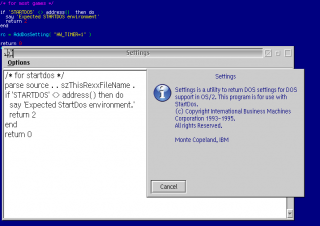|
StartDos v. 13101995 (26/6/2018, International Business Machines Corporation (IBM)) |
Readme/What's new |
StartDos
(c) Copyright International Business Machines Corporation 1993-1995.
All rights reserved.
Monte Copeland, monte@vnet.ibm.com
Introduction to StartDos
StartDos is an OS/2 program to start virtual DOS mode (VDM) sessions under
OS/2. The nature of DOS sessions under OS/2 is controlled by DOS settings
strings. StartDos accepts these strings via a REXX command file then starts a
DOS session using those settings. Here are some examples of DOS setting
strings for StartDos and OS/2:
Setting string Comment
---------------------------------------- ------------------------------
"DOS_DEVICE=c:\os2\mdos\ansi.sys" load ANSI support
"DOS_HIGH=1" 1 means yes, load DOS high
"DPMI_DOS_API=ENABLED" DPMI is enabled
"DPMI_MEMORY_LIMIT=8" DPMI will have 8 megabytes RAM
StartDos uses REXX as a string-delivery mechanism. You will create REXX
command files especially for StartDos. These REXX command files use StartDos
functions to set up the DOS settings. StartDos comes with a separate utility
program, SETTINGS.EXE, to help you create REXX scripts for StartDos.
StartDos is normally used in text mode. A version for OS/2 Presentation
Manager exists and may prove useful for some applications.
StartDos is IBM Employee Written Software. Please read the "as-is" license
agreement from IBM. Essentially, you use this program "as is," and IBM makes
no warranty about the correctness of this program or its suitability to any
purpose.
StartDos Usage
StartDos expects a REXX command file name on the command line. Usually this
file name ends with .CMD. StartDos will add .CMD if necessary. StartDos looks
in the current directory for the file. If not found, it searches the PATH.
Then StartDos loads it and runs REXX on it. An example StartDos command line
might be:
startdos mydos
where mydos implies MYDOS.CMD somewhere in the PATH. In general, StartDos
command lines look like this:
startdos <REXX file> <optional arguments>
REXX for StartDos
The REXX command file executes in a special StartDos environment. The REXX
program calls StartDos functions such as AddDosSetting(). Here is an example
REXX program that starts a DPMI DOS session. Note that all REXX programs must
have a comment at line 1, column 1.
/* DPMI.CMD: a REXX command file for StartDos */
if 'STARTDOS' <> address() then do
say 'ooops, expected StartDos'
return 2
end
rc = AddDosSetting( 'DPMI_DOS_API=ENABLED' )
rc = AddDosSetting( 'DPMI_MEMORY_LIMIT=8' )
return 0
This program checks the environment to make sure it is StartDos. A REXX
program can switch its behavior depending on the current environment. This one
works under both CMD and STARTDOS:
/* DOS.CMD: a REXX command file for StartDos */
select
when address() = 'CMD' then do
parse arg szArgs
parse source . . szREXX .
'startdos' sREXX szArgs
end
when address() = 'STARTDOS' then do
rc = AddDosSetting( 'DPMI_DOS_API=ENABLED' )
rc = AddDosSetting( 'DPMI_MEMORY_LIMIT=8' )
end
otherwise do
say 'ooops, expected StartDos or CMD.'
return 2
end
end
return 0
This program parses arguments and passes them to StartDos. StartDos normally
passes these arguments to COMMAND.COM. Examples of DOS.CMD command-line usage:
Example Remarks
------------ ---------------------------------------------------------
dos starts a DOS session
dos /k dir starts DOS, does a dir, and keeps (/k) the session
dos /c wp starts DOS, calls (/c) wp.exe, session stops when wp ends
The REXX program should return a zero result code, and StartDos will start the
session. If non-zero, no session is started. If you specify an incorrect DOS
setting, chances are the session will start anyway. You may get an error
message from OS/2.
REXX is always installed on OS/2 Warp, but it was optional on earlier versions
of OS/2. You must have REXX installed to use StartDos. Get help on REXX with
the OS/2 command:
VIEW REXX
Special StartDos Functions
These special functions are available to REXX programs invoked from StartDos:
StartDos function Comment
------------------------------------ ---------------------------------
AddDosSetting( <setting string> ) may be called multiple times
ExecSynchronous() asynchronous start is default
QueryDesktop() returns PM desktop size in pels
SetCommandArgs( <command.com args> ) args acceptable to command.com
SetWindowPos( x, y, cx, cy ) set position, size of window
SetSessionTitle( <session title> ) title to appear in window list
StartBackground() start session in background
StartForeground() foreground start is default
StartFullscreen() fullscreen start is the default
StartWindowed() start session in a text window
StartSeamless() start windows programs
AddDosSetting( <setting string> ) -- AddDosSetting may be called multiple
times in order to specify all the setting strings to StartDos. Expects one
string parameter.
ExecSynchronous() -- The default exec is asynchronous, so StartDos will end as
soon as the DOS session is started. A synchronous exec is one where StartDos
waits until the DOS session ends before StartDos itself ends. In this case,
StartDos will return the same errorlevel as COMMAND.COM. COMMAND.COM in OS/2
returns the same errorlevel as the DOS program invoked with the /c option.
Therefore, a synchronous exec and /c option causes StartDos to return with the
same errorlevel as the DOS program. This is important when invoking DOS
programs from OS/2 batch (or make) files. Expects no parameter.
QueryDesktop() -- returns a string "xxx yyy" which is the size of the PM
desktop window in pels. For example, the string "640 480" is returned for PM
on VGA. This is useful to compute x, y, cx, cy for the SetWindowPos()
function. There are no parameters to QueryDesktop(). Returns a zero-length
string under TShell.
SetCommandArgs( <command.com args> ) -- Parameters to COMMAND.COM may be
specified two different ways: on the StartDos command line after the REXX
command file name, or by using SetCommandArgs() in the REXX command file.
SetCommandArgs() always overrides arguments given on the StartDos command
line. Optional arguments given on the StartDos command line are available via
PARSE ARG to the REXX program running in the StartDos environment.
SetSessionTitle( <session title> ) -- Sets the session title that appears in
the Window List. Expects one string parameter.
SetWindowPos( x, y, cx, cy ) -- provide initial placement and size of a DOS
session when a windowed session is desired. When SetWindowPos() is used,
StartWindowed() is not required. Expects four numeric parameters in pels. x
and y are position, cx and cy are size. See QueryDesktop(). Invalid under
TShell.
StartBackground() -- Start the DOS session in background. No parameters.
StartForeground() -- Start the DOS session in the foreground. This is the
default action. No parameters.
StartFullscreen() -- Start the DOS session in its own, full screen session.
This is the default action. No parameters.
StartWindowed() -- Start the DOS session in a PM text window. Expects no
parameters. Invalid under TShell.
StartSeamless() -- When used without parameters, will start WINOS2.COM in its
own seamless VDM session, and SetCommandArgs() will supply parameters to
WINOS2.COM. When used with parameters, they are as follows:
Parameter 1. program category, a numeric parameter
parameter program category
--------- -------------------------------
13 PROG_30_STDSEAMLESSVDM
14 PROG_30_STDSEAMLESSCOMMON
15 PROG_31_STDSEAMLESSVDM
16 PROG_31_STDSEAMLESSCOMMON
17 PROG_31_ENHSEAMLESSVDM
18 PROG_31_ENHSEAMLESSCOMMON
19 PROG_31_ENH
20 PROG_31_STD
Parameter 2. windows program exe name
Parameter 3. startup directory (optional)
Any parameters set with SetCommandArgs() are for the windows program exe. If
you specify any StartSeamless() parameters, parameter 3 is optional.
Helper Program: settings.exe
Settings.exe is a program to help write REXX for StartDos. Settings.exe is a
Presentation Manager program. Start settings.exe from any command prompt with
the command
settings
The program presents a DOS Settings window. Change the settings as required
and press OK. The program generates REXX code for StartDos for those settings.
Settings.exe has no save-to-file function, but it can copy to the Presentation
Manager clipboard. From the menu, select Copy, then paste into an editor such
as the EPM.EXE enhanced editor that comes with OS/2. REXX programs must have
a starting comment, /*, in line 1 column 1.
Sample REXX: Diskette cleaner
Assume there is a DOS program called cleandsk.exe that writes zeroes to unused
sectors on a floppy disk. This REXX program runs it in the background.
Because of ExecSynchronous(), StartDos will not end until cleandsk.exe ends.
When it does, StartDos returns the same errorlevel as cleandsk.exe.
This program takes control of argument passing. It sets them explicitly with
SetCommandArgs().
/* clean.cmd */
parse arg szDriveLetter .
parse source . . szREXXFileName .
select
when 'CMD' = address() then do
/* CMD "magically" sets rc when StartDos ends */
'STARTDOS' szREXXFileName szDriveLetter
say 'cleandsk.exe errorlevel' rc
end
when 'STARTDOS' = address() then do
rc = ExecSynchronous( )
rc = SetCommandArgs( "/c cleandsk" szDriveLetter )
rc = StartBackground()
end
otherwise do
say 'Unexpected execution environment'
return 4
end
end
return 0
Then from an OS/2 prompt, enter
CLEAN A:
Sample REXX: Seamless windows write
In OS/2, windows programs may run "seamlessly" on the same desktop as the OS/2
Presentation Manager. This REXX program starts the windows program WRITE.EXE
to run "seamless." For seamless starts, SetCommandArgs() really sets the
arguments to WINOS2.COM. To WINOS2.COM, /s means standard mode and /3 means
enhanced mode.
/* write.cmd */
parse source . . szREXXFileName .
select
when 'CMD' = address() then do
'STARTDOS' szREXXFileName
end
when 'STARTDOS' = address() then do
rc = StartSeamless()
rc = SetCommandArgs( "/3 write" )
end
otherwise do
say 'Unexpected execution environment'
return 4
end
end
return 0
Sample REXX: Seamless Common VDM
For performance reasons, you may want to run all your windows programs in a
common VDM session. The first start takes longer, but subsequent starts load
much more quickly.
/* notepad.cmd */
parse source . . szREXXFileName .
select
when 'CMD' = address() then do
'startdos' szREXXFileName
end
when 'STARTDOS' = address() then do
rc = StartSeamless( 18, "notepad.exe" )
end
otherwise do
say 'Unexpected environment'
end
end
return 0
Sample REXX: Multiple Settings Strings
The DOS_DEVICE and DOS_VERSION settings have multiple components. For example,
the DOS_DEVICE setting requires that all device drivers be set with a single
DOS_DEVICE setting string. These device driver names are separated with the
line feed character, an ASCII 10.
The REXX function d2c(10) helps to build the string acceptable to DOS_DEVICE
and DOS_VERSION. Example REXX:
/* for startdos */
if 'STARTDOS' <> address() then do
say 'Expected StartDos environment.'
return 2
end
/* this shows d2c(10) and the comma used for REXX line continuation */
rc = AddDosSetting( 'DOS_VERSION=DFIA0MOD.SYS,3,40,255'||d2c(10)||,
'EXCEL.EXE,10,10,4'||d2c(10)||,'WIN200.BIN,10,10,4' )
/* similar thing */
rc = AddDosSetting( 'DOS_DEVICE=c:\os2\mdos\ansi.sys'||d2c(10)||,
'c:\os2\mdos\ega.sys' )
return 0
Sample REXX: Window Size and Position
This sample calls QueryDesktop for PM information, then starts a windowed DOS
session squarely in the center of the screen.
/* for startdos */
if 'STARTDOS' <> address() then do
say 'Expected StartDos environment.'
return 2
end
/* ask about PM */
xy = QueryDesktop()
if length( xy ) = 0 then do
/* must be TShell, where there is no PM */
return 2
end
x = word( xy, 1 )
y = word( xy, 2 )
rc = SetWindowPos( x/4, y/4, x/2, y/2 )
return 0 |





Aggiungi un commento